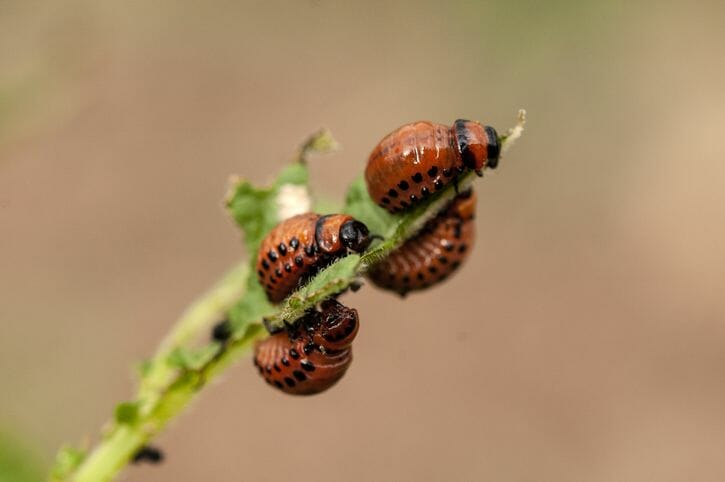UPDATE: Wednesday June 17, 4:55pm ET to add comments from GreenLight investor S2G.
Switching sharply to developing a vaccine for Covid-19 appears to have proved a boon for GreenLight Biosciences, a company that previously focused on developing biological pesticides. The Massachusetts-based biotech firm has just raised an oversubscribed $102 million Series B round of funding, AFN can confirm, and much of this will go toward countering the ongoing global pandemic with a vaccine.
[Disclosure: GreenLight Biosciences is a portfolio company of AgFunder, which participated in its Series B round and is also the parent company of AFN.]
This seems like a dramatic pivot. But in truth, it is not such a distant leap from targeting crop-gobbling insects like the Colorado Potato Beetle. Both require the cheap, fast, and reliable creation of specific strands of RNA, a natural molecule that controls biological processes in all living things. Doing so has always been the opposite: costly, slow, complex — even unreliable.
Other manufacturers in biotech turning their hands to RNA-based vaccine production have been used to competing against other vaccinators. But GreenLight has spent years in another kind of war of price and scale — the highly commoditised world of chemical pesticides. While questions are mounting over their ecological and health risks, agri-chemicals still prove extremely cheap and effective, at least with a short-term mindset.
GreenLight’s attempts to compete here have led to its development of RNA strands that are cheap and quick to manufacture, the company says, and lethal to pests. For example, the cost of RNA for the development of agricultural biocontrols has been as high as $100-$10,000 per gram. GreenLight says its patented, cell-free bioprocessing platform can produce targeted RNA products at a significantly lower cost.
And hence — $102 million for GreenLight in a round led by Morningside Ventures, with participation from S2G Ventures, AgFunder, Cormorant Asset Management, Continental Grain Company, Fall Line Capital, Tao Capital Partners, Baird Capital, MLS Capital Fund II, Lewis and Clark AgriFood, Lupa Systems.
The investment follows a $17 million special purpose round in May 2020 to accelerate large-scale manufacturing of future Covid-19 vaccines using the company’s proprietary messenger RNA (mRNA) production technology. This latest funding package will stretch this foray into other areas of human health, as well as support the launch of the company’s first biopesticide in 2022. The funds, the investors say, will bankroll the development of other crop protection products too.
“GreenLight Biosciences’ manufacturing technology can address critical pain points for RNA supply in both agriculture and human health,” said Jason Dinges of Morningside Ventures, in a statement. “RNA-based products represent an opportunity for innovation in both human therapeutics as well as safe, environmentally-friendly crop protection.”
A New Dual
GreenLight’s co-founder and CEO Andrey Zarur now describes this as “our dual mission to make food production more robust and environmentally respectful; and our health solutions applicable to every member of the human race. We remain steadfast in our commitment to provide bio-based solutions for plant health, human health, and animal health, and to make those solutions affordable and accessible.”
Which of side of this dual mission will ultimately take strategic precedence? That will doubtless be a major debate among management and in the boardroom in the months to come. After all, straddling the world of agriculture and human health can mean distinct regulatory hurdles and differing approaches to lowering cost and achieving scale. Discussing this in a phone call with AFN on Wednesday, S2G Ventures managing director Matthew Walker said a key unifying point here would be a continued dedication to its core focus on RNA production capability.
“We really want to be supportive of that effort,” he said. When S2G first did due diligence on the company, Walker said, impressive field trials showed a route to cheaper yet still precise RNA production and its impacts on crop protection. “Frankly, the proof was in the pudding,” he said — but that never closed off other possible opportunities as they came to light. In fact, with the scramble for vaccines in light of the current pandemic, GreenLight expanding its platform’s applications beyond agriculture, Walker said, is “complementary.”
There are good reasons to suspect this will not presage an exodus from agriculture for GreenLight, however. Instead, Walker still sees the company as “well-positioned” to capitalise on what he calls “a sea change” in the way consumers and regulators see agri-chemicals. Namely, awareness is rising about chemical collateral damage to surrounding microbes and wildlife. That means, “you have to think of a broader set of constituencies here; you have to think about soil health, the health of beneficial insects, the environment downstream, and ultimately the health impact on the end consumer.”
Despite coronavirus, he sees the company as well on course for its 2022 biopesticide launch, and expects other biopesticide products that avoid the collateral damage of its rival agrichemical products to follow suit.





